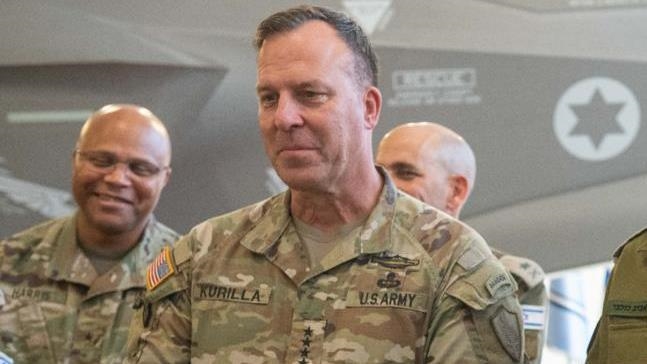Bush announces war’s beginning
"We will broadcast to you shortly an important speech by the president, direct leader and struggler Saddam Hussein. May God protect him," the television announcer said.
"On my orders, coalition forces have begun striking selected targets of military importance to undermine Saddam Hussein’s ability to wage war. These are opening stages of what will be a broad and concerted campaign," Bush said in an unusual late-night Oval Office address.
Bush spoke little more than two hours after Iraqi President Saddam Hussein ignored Bush’s 48-hour deadline to go into exile.
Another Baghdad radio station run by Saddam’s elder son Uday played a military song and called on local people to resist: "This is our day. Let us start the fight. We will be victorious. We will all die as faithful martyrs."
The first blasts seemed to come from the southern and eastern suburbs. Heavy plumes of black smoke billowed from the east after the same target appeared to have been hit three or four times. Explosions later hit the city centre.
Reuters correspondent Nadim Ladki heard the first two or three blasts at 5:33 a.m. (0233 GMT), as warplanes screamed overhead at medium altitude. The strikes seemed to centre on a few specific targets and there was a lull after an hour as a grey, cloudy dawn broke over the city.
Police cars with sirens wailing raced through otherwise deserted streets. Air raid sirens had begun wailing out within a minute of the first strike.
Electricity was still working in the city centre but state radio ceased broadcasting after the blasts. Minutes later, a new announcer broke in on state radio’s frequency, apparently from the U.S. military, speaking in Arabic.
"The facilities of the Iraqi regime have started to be hit," the new announcer said.
Reuters correspondents saw nine U.S. strike aircraft taking off between 0030 and 0130 GMT from Qatar’s Al Udeid airbase.
They turned on their afterburners and climbed away almost vertically from the desert base. Two large aerial refuellers accompanied the jets in bright moonlight.
Uday’s radio station in Baghdad said: "Our brother martyrs will die defending our great Iraq. Today is our day. Rise up our brothers for the jihad. Hit the enemies and prove that we are sons of freedom and honour.
"Rise up like lions. Saddam is our beloved leader and God is our great Allah. Rise up, rise up and attack the foreigners. Victory with God’s help is near…defeat the infidel enemy."
Bush, under fire in various capitals for abandoning U.N. diplomacy and a possible peaceful end to the Iraqi crisis, said the United States had the support of 35 nations in the Iraq war, ranging from the use of naval and air bases to help with intelligence and logistics.
To the U.S. military, Bush said: "To all of the men and women of the United States armed forces now in the Middle East, the peace of a troubled world and the hopes of an oppressed people now depend on you."
He said the war on Iraq may not be as short as he and military planners hope.
"A campaign on the harsh terrain of a nation as large as California could be longer and more difficult than some predict," he said.
He said the aim will be a united, stable and free Iraq and vowed a sustained commitment to that goal.
"We come to Iraq with respect for its citizens, for their great civilization and for the religious faiths they practice.
We have no ambition in Iraq, except to remove a threat and restore control of that country to its own people," he said.
"This will not be a campaign of half measures. We will accept no outcome but victory."
Earlier, over a quarter-million troops coiled in attack positions around Iraq awaiting orders to invade Iraq.
A 26-kilometre-long convoy of tanks, armoured personnel carriers, fuel trucks and artillery pieces were seen rumbling northwards today through Kuwait towards the Iraqi border.
The sight of the immense force massing within view of their border was too much for 17 Iraqi soldiers posted along the southeastern frontier shared with Kuwait.
They laid down their weapons and surrendered to Kuwaiti police before a single bullet was fired.
U.S. and British forces have not yet received orders to launch a ground attack on Iraq but are ready to go, British military spokesman Colonel Chris Vernon told Reuters early Thursday. local time.
U.S. military spokesman Major David Andersen said he was unable to confirm any ground activity at the moment. Witnesses said the Kuwait-Iraq border area, where thousands of U.S. and British troops have massed, was quiet.
The Iraqi capital had taken on the air of a ghost town on the eve of Bush’s deadline. Shops and restaurants were shut and the streets deserted. Trenches had been dug and sandbags placed around official buildings and handfuls of militiamen with Kalashnikov rifles posted outside in recent days.
To the south, where U.S. and British forces are massed on the ground in Kuwait and aboard ships in the Gulf, there was little sign of an increase in activity overnight on the ground.
A British military spokesman said no orders had yet been given to launch the expected U.S.-led ground attack.
Reuters correspondent David Fox, in northern Kuwait close to the Iraqi border, said there had been little movement among the troops, who number more than 280,000 in the region as a whole.
Some combat units had moved into the demilitarised zone that straddles the Iraq-Kuwait border on Wednesday.
Bush and British Prime Minister Tony Blair have massed their armies in the region to kill or capture Saddam, overthrow his government and rid Iraq of chemical and biological weapons the United States accuses it of stockpiling.
Iraq denies having such weapons. The war has sharply divided Washington’s allies.
The demilitarised zone, monitored by the United Nations since the 1991 Gulf War, extends 5 km (three miles) into Kuwait and 10 km into Iraq. Soldiers donned chemical suits at desert staging posts that were swept by fierce sandstorms.
U.S. officials had said upward of 3,000 satellite-guided bombs and cruise missiles would be unleashed from sea and air on targets vital to Saddam’s government to start the war.
In northern Iraq, where Kurds run their own affairs under the protection of a post-Gulf War no-fly zone, the de facto frontier with Saddam’s forces was also quiet.
Reuters correspondent Jon Hemming, on the Kurdish side of the border near the town of Dohuk, said Kurdish fighters told him 10 Iraqi military trucks had moved up to the Iraqi lines on Wednesday evening and local residents said Kurdish "peshmerga" guerrillas had reinforced their own lines.
Hemming also said a handful of European-looking men in civilian clothes had headed for a position nearby with Kurdish guards. Kurdish fighters say they have been cooperating with U.S. special forces in the region, which lies close to the Iraqi cities of Mosul and Kirkuk, the main oil centre in the north.
The United States had wanted to open a northern front to attack Iraq from NATO ally Turkey.
But, faced with popular opposition to war on fellow Muslims, Ankara balked at letting U.S. troops onto its soil.



